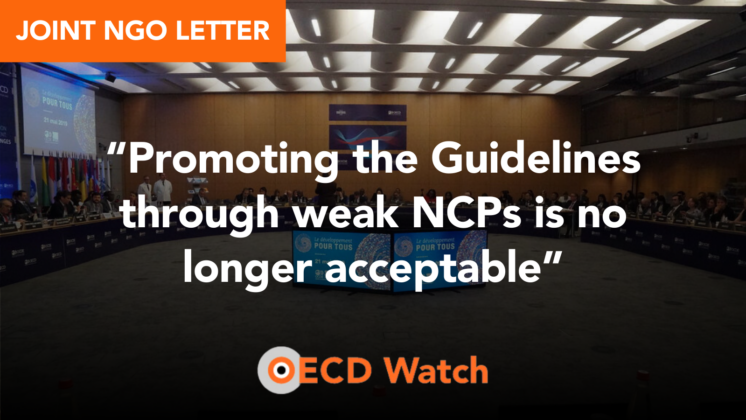Gaps must be addressed via revision of the OECD Guidelines’ Procedural Guidance

OECD Watch has completed its second evaluation of NCPs according to a set of 40 key performance indicators (KPIs) assessing elements of NCPs’ complaint handling procedures, organisational structures, and communication and promotion activities. The evaluation results show a slight increase in alignment for the majority of indicators – but too little improvement on the most important indicators.
Visit OECD Watch’s NCP Evaluations webpage to view the overall performance of all 49 NCPs as well as the individual performance of each NCP.
NCP Performance – Latest Analysis
The latest evaluation of NCPs reveals NO CHANGE in several of the KPIs of top priority for civil society, such as:
- The number of NCPs (13) whose policies commit them to issuing determinations of compliance with the Guidelines in complaints,
- The number of OECD governments (5) that will impose consequences on companies that breach the Guidelines or refuse to engage in the NCP process, and
- In a worrying backsliding, the number of NCPs committed to transparency on appropriate elements and periods of the complaint process (11 down from 12).
However, there were several positive changes of note:
- Two more NCPs (17 in total now) have committed to undertaking follow-up on agreements made and recommendations given,
- Two more NCPs (38 total) have published rules of procedure in national languages and English,
- Six NCPs redrafted their rules of procedure, often improving language such as by clarifying their commitment to accepting plausible claims (18 total) or their openness to accepting claims filed by civil society organisations rather than only directly-impacted people (20 total), and
- Three more NCPs (13 total) now involve non-governmental stakeholders in the processing of complaints.
Guidelines need to be improved
As compared with the first assessment, the number of NCPs aligning with the KPIs increased for 24 of the 40 indicators and declined for eight. The gains show the tangible value of the evaluations project. The KPIs show NCPs where they should improve, and the evaluations are slowly but measurably encouraging NCPs to adopt the needed reforms.
However, the overall low performance of NCPs across most KPIs, the small extent of the gains, and the gains’ skewed scope – with improvements primarily made to NCPs’ communication activities instead of their more important complaint-handling procedures and organisational structures – show that more is needed: the Guidelines’ themselves must be updated to raise the baseline requirements for NCPs and fast-track achievement of functional equivalence between them. For example:
- NCP complaint-handling procedures should be clarified and standardized with the goal of promoting accessibility, transparency, impartiality, and accountability in identifying multinational enterprises’ (MNEs’) non-adherence with the Guidelines and encouraging and assessing MNEs’ progress to improve.
- NCP structures should be improved to ensure NCPs have access to diverse expertise, including input from civil society, union, and business stakeholders, and better protection against conflict of interest.
A tool to guide discussion on updating the Guidelines
The evaluation results point to the need for higher baseline expectations for NCPs. The OECD has recently completed a review (“stocktaking”) to assess whether the Guidelines remain fit for purpose. In contribution to that review, civil society has identified numerous gaps in the Guidelines on human rights and environmental issues as well as on the expectations for NCPs, and has proposed revision of the Guidelines. OECD Watch urges the OECD to use the NCP Evaluations project as a launch point for discussion on areas for reform for NCPs. Most of the 40 KPIs are not controversial and could be adopted as required practice for NCPs in the Guidelines; all highlight critical aspects of procedural justice that should be discussed during any pending update to the Guidelines.
Background on OECD Watch’s NCP Evaluations project
First launched in December 2020, OECD Watch’s NCP Evaluations project exposes gaps in performance by NCPs on KPIs of concern to civil society, including especially notifiers in complaints.
The Guidelines require NCPs to operate in accordance with core criteria and complaint handling principles such as transparency, accountability, accessibility, and impartiality. While governments have flexibility in establishing their NCP, each must operate in a manner “functionally equivalent” to the others.
Unfortunately, after 20 years of existence, it is widely agreed that the NCPs are not, collectively, fulfilling their requirements, nor operating effectively and equivalently to each other. Shortcomings in organisational structure, communication and promotion activities, and especially complaint handling procedures are hampering their efforts to increase corporate adherence to the Guidelines and preventing them from facilitating access to remedy for victims of adverse corporate conduct.
To help civil society, the OECD and NCPs, and other stakeholders understand where the gaps in equivalence are between NCPs, OECD Watch measures every NCP (now 49 NCPs, an increase from the previous assessment with the recent creation of the new Croatian NCP) against a set of 40 KPIs on topics such as engagement with stakeholders, confidentiality during complaint processing, and follow-up on complaint outcomes. Some of the indicators are legal requirements of states under the OECD Guidelines, while others represent civil society priorities for effective functioning of NCPs. The evaluations do not score or rank the NCPs, but rather provide objective information on aspects of NCP organization and functioning that are important to civil society. During the development of the second assessment, 39 of the 49 NCPs provided helpful feedback to OECD Watch; OECD Watch is appreciative of the support and looks forward to working with NCPs to continue to raise their performance.
For more information, please
- Check out OECD Watch’s NCP Evaluations project
- Read our analysis of the second assessment results
- Understand our Evaluations project methodology
- Visit our complaints database to see records of all complaints filed by civil society and communities to NCPs













